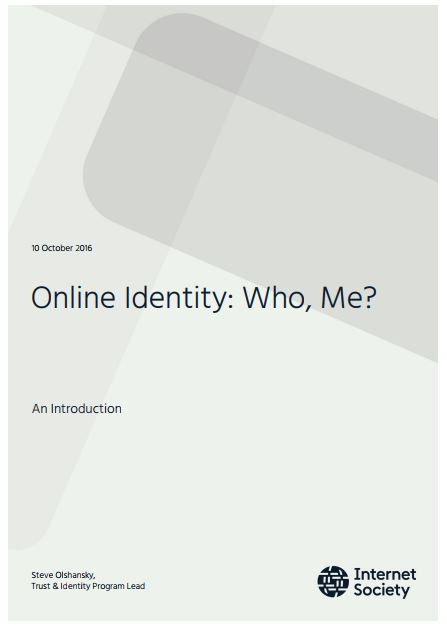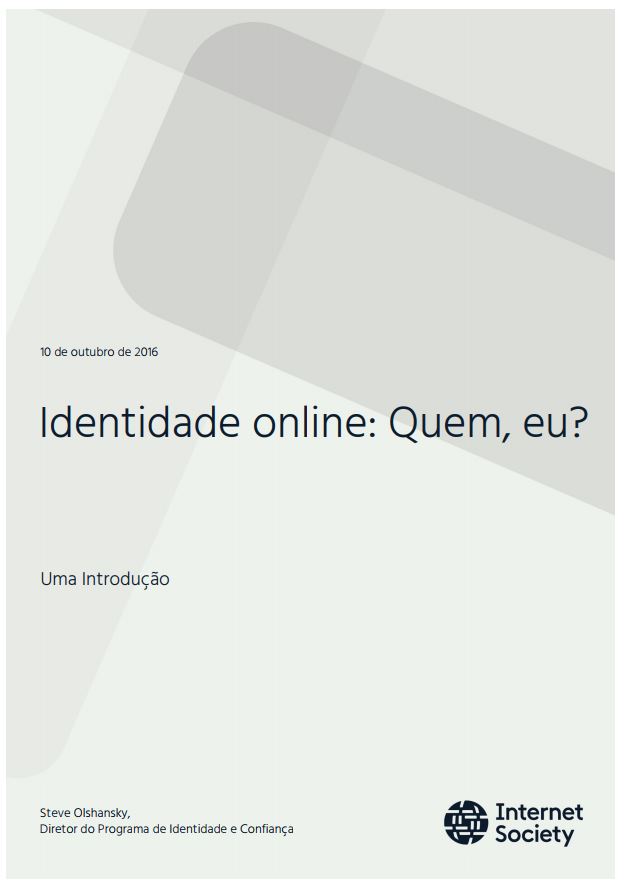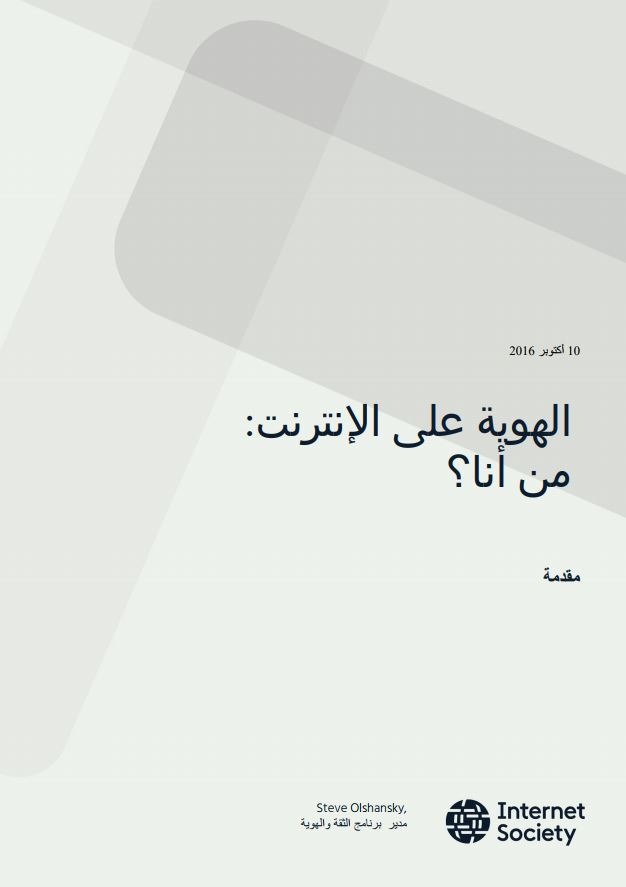*This paper is also available in French – Portuguese – Arabic
By Steve Olshansky,
Trust & Identity Program Lead
Introduction
As the Internet has become more central in our day-to-day lives, issues relating to our online identities have become more important, and the potential impacts on our lives more significant in both positive and negative ways. We as individuals interact with a number of online sites and services which require an account (username and password) to access. This can be something as simple as news sites which restrict the number of articles you can read anonymously in a certain time period, to your personal financial or healthcare or similar online services which want to know with certainty that you are definitely YOU before granting access to private information. And of course, we WANT them to be certain about who we are before granting access to this kind of very sensitive information, which could be used to harm us in various ways if it were to fall into the wrong hands.
This brief document is the first of a series which is intended to serve as a useful reference for online identity-related topics, and will include links to a number of resources produced by the Internet Society that you will find useful.
You and Your Information
You, as the subject of your personal information, have the ultimate right and responsibility to control who has access to certain pieces of it, and when, and to protect it from abuse to the best of your ability. There are many pieces of information about you, ranging from publicly available to very private, and it is good to be aware of who is asking for it, why they want it, and how it is and will be used and protected. There are varying levels of trust that relate to the risk associated with any particular interaction, and it is ultimately up to us to make determinations about how much trust to put in any particular person or service we encounter online. It is also up to us to take whatever steps we decide are necessary as a result to protect our information and ourselves.
With the rise of social identity providers, such as Facebook, Twitter, Google, and many others, people have many more options to choose from when deciding which service to use to manage their identities beyond what they may have available from a school or employer or government. In fact, many people use multiple identities (personas) for different purposes, and for different levels of privacy and security. It has become harder for organizations holding information about us to protect it from unauthorized access, and thus it is all the more important for us to be aware of the issues involved. How do we know if we can trust a person or service online, and if so, to what degree? How certain can we be that a person or service is in fact who they claim to be? What kinds of information are we willing to reveal to people or services we encounter online, and how will they use it and protect it from misuse? How certain are we that our communications with others which we intend to be private, really are? Who is able to view our communications, and what could they do with this information? What steps can we take to protect our information and communications?
The Internet Society has produced some useful materials for reference, and you are welcome and encouraged to review them:
Your Digital Footprint Matters
http://www.internetsociety.org/your-digital-footprint-matters
(Available also in French, and Spanish)
Your digital footprint paints a picture of who you are. Make sure it’s accurate. Learn how in a few easy tutorials. Every day, whether we want to or not, most of us contribute to a growing portrait of who we are online; a portrait that is probably more public than we assume. This portrait helps companies target content at specific markets and consumers, helps employers look into your background, and helps advertisers track your movements across multiple websites.
Whatever you do online, you might be leaving digital footprints behind. So no matter what you do online it’s important that you know what kind of trail you’re leaving, and what the possible effects can be. While it’s not possible to have ZERO footprints, the first steps toward reducing your digital footprint and managing your digital identity are not that hard.
Tutorials: Learn About Your Digital Identity
https://www.internetsociety.org/issues/identity/
(Available also in French, Spanish, Bahasa Indonesian, and Urdu)
Every time we log onto the web we access (and add to) our own personal digital footprint that’s interconnected with plug-ins, links, and massive caches of personal data that follows us around. While none of us can control everything that’s known about us online, there are steps we can take to better understand our online identities and be empowered to share what we want, when we want.
The Internet Society developed three interactive tutorials to help to help educate and inform anyone who wants to know what steps we can take to better understand our online identities, learn about their digital footprint and be empowered to share what we want, when we want. Each video lasts about 5 minutes and is aimed at helping all of us become more aware of how we disclose information and how we can keep it more private.
1. Understanding your Online Identity: An Overview of Identity (English)
https://www.internetsociety.org/issues/identity/
This tutorial will explain some of the key differences between your online and “real life” identity, help you recognize the nature of digital identities, and understand the difference between online identity and personal privacy.
2. Understanding your Online Identity: Protecting your Privacy
https://www.internetsociety.org/issues/identity/
This tutorial will explain the key concerns related to online identity and privacy, help you recognize what kind of user information is collected and why, and identify the ways of controlling the privacy of your online identity.
3. Understanding your Online Identity: Learning to Protect your Online Identity
http://www.internetsociety.org/protecting-your-identity
This tutorial will explain the challenges in protecting online identities and help you recognize the ways you can protect your online identity.
An Introduction to Privacy on the Internet – An Internet Society Public Policy Briefing
http://www.internetsociety.org/policybriefs/privacy
Privacy helps reinforce user trust of online services, yet online privacy is under constant pressure of being undermined. Promoting strong, technology-neutral data-privacy laws, privacy-by-design principles, and ethical data-collection and handling principles is a key approach to protecting and fostering online privacy.
Have you chosen an Identity Provider lately?
http://www.internetsociety.org/doc/have-you-chosen-identity-provider-lately
In this white paper, we look at the changing world of identity provision. Digital identity is evolving from a “retrospective” model to an increasingly predictive one, based on behavioural data as much as traditional credential. There is also a shift from siloed credentials towards more transferable assertions of identity and attributes. Potentially, these changes offer the individual more choice and power – but only potentially. Emerging identity models also contain hidden pitfalls, of which users need to be aware if they are to influence the market through effective exercise of choice.


